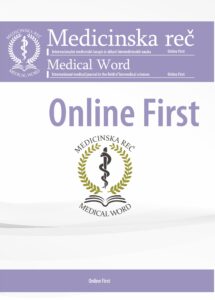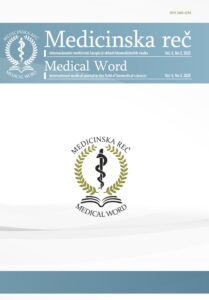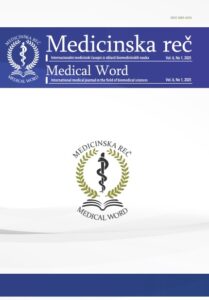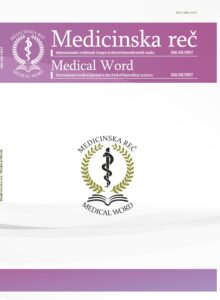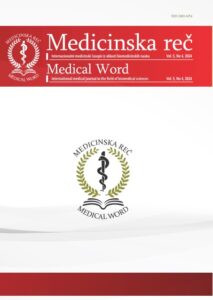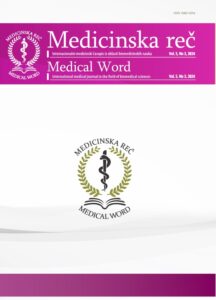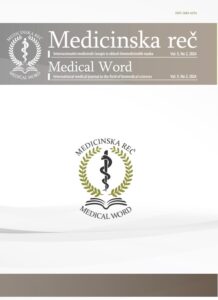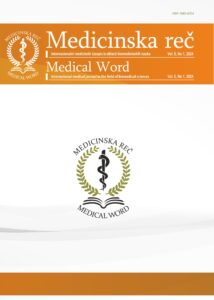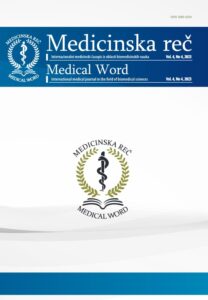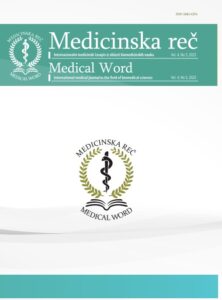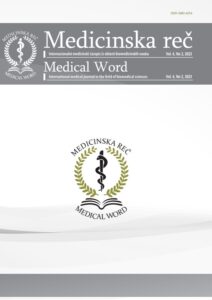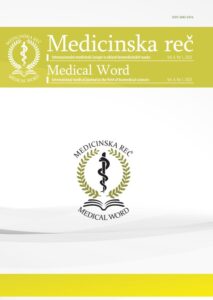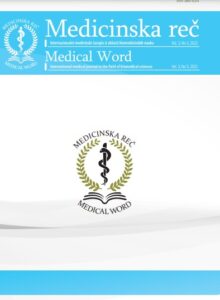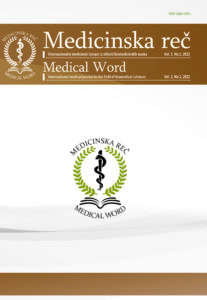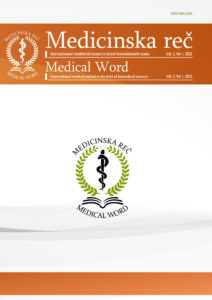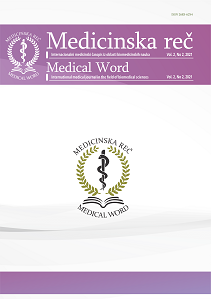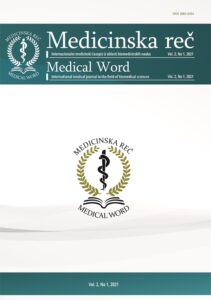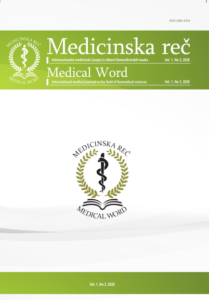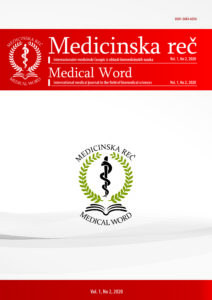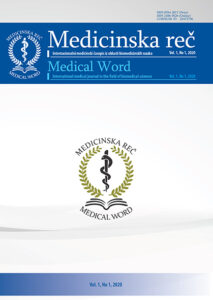Processing and storage of blood components as a precondition for safe transfusion
Ana Antić, Sanja Živković Đorđević, Suzana Stevanović, Marija Jelić
Med Word 2020; 1(1): 10–14
DOI: https://doi.org/10.5937/medrec2001010A
Abstract
The preparation of blood components from whole blood collections must be standardized and compliant with recommendations, EU Directives and Standard Operative Procedures (SOPs). In order to achieve safe and efficient transfusion it is important to have automated separation of whole blood unit producing standardized blood components, good quality control and increased work efficiency. It is also very important that all blood components should be ISBT 128 labelled and properly storaged under the regulated conditions.
One of the most important factors that increases transfusion safety is leucoreduction of blood components, which prevents several adverse effects following blood transfusion, as well replacement of plasma as a storage medium in red blood cells and platelet concentrates with preseravative solutions, which results in the reduction of iso- and HLA-antibodies and plasma proteins.
Pathogen inactivation in blood products is the trend of modern blood transfusion practice and acts in the removal or inactivation of all pathogens that can be blood transmitted. It does not replace testing of blood units for transfusion transmitted diseases, but it reduces the risk of “window phenomenon” and errors in testing, acting on the agents that are not included in routine testing. In circumstances where the pathogen reduction has not been introduced in practice routine bacteriological testing of blood components significantly decreases the occurence of adverse reactions on contaminated blood.
Processing using the most appropriate and effective methodologies and best laboratory practices, efficient inventory management system for optimum blood stocks, and effective blood cold chain for safe storage and distribution of blood and blood products are key requirements to ensure the safety of blood products.
Key words: transfusion, safety, blood components
References
- Stanojković Z, Antić A, Vučić M, Mačukanović Golubović L. Preparation, use and clinical efficiency of blood products. Bilt Transfuziol (Lectures and Abstract Book) 2018; 63(1–2): 30–3.
- Libek V. Modern day technologies in blood component processing – up to date transfusion therapy. Bilt Transfuziol (Lectures and Abstract Book) 2018; 63(1-2): 34–9.
- Pietersz R, van der Meer P. Processing and storage of blood components: strategies to improve patient safety. Int J Clin Transf Med 2015; 3: 55–64.
- Guide to the preparation, use and quality assurance of blood components, 19th. EDQM, 2017.
- Directive 2002/98/EC of the European Parliament and of the Council of January 2003 setting standards of quality and safety for the collection, testing, processing, storage and distribution of human blood and blood components and amending Directive 2001/83/EC. Off J Eur Union. 2003; L33:30.
- Antić A, Stanojković Z, Stevanović S, Dinulović S. Implementacija softverskog sistema MAKeProgesa u ZTK Niš. Bilt Transfuziol 2007; 53(1–2): 58–62.
- Jurado M, Algora M, Garcia-Sanchez F, et al. Automated processing of whole blood units: operational value and in vitro quality of final blood components. Blood Transfus 2012; 10(1): 63–71.
- Ekiaby MA. Automation in blood processing. Vox Sang 2017; 12(1): 87–90.
- Gupte SC. Automation in Blood Centre: Its impact on Blood Safety. Asian J Transfus Sci. 2015; 9(Suppl 1): S6–S10.
- Distler P, Ashford P. Twenty‐five years later: has ISBT 128 fulfilled its promise? Transfusion 2019; 59(12): 3776–82.
- Antić A, Stanojković Z, Stevanović S, Dinulović S. Implementations of ISBT 128 labeling in Blood Transfusion Institute Niš-South Serbia. Vox Sang 2007; 93(1): P-245.
- Balint B, Todorović M. Hemoterapija-nepovoljni sporedni efekti. U: Balint B, ed. Osnovni principi hemoterapije. Čigoja, Beograd 2010: 383–97.
- Eernisse G, Brand A. Prevention of platelet refractoriness due to HLA antibodies by administration of leukocyte-poor components. Exp Haematol 1981; 9: 77–83.
- Higgins VL. Leukocyte-reduced blood components: patient benefits and practical applications. Oncol Nurs Forum 1996; 23(4): 659–67.
- Shapiro MJ. To filter blood or universal leukoreduction: what is the answer?. Crit Care. 2004; 8 Suppl 2(Suppl 2): S27–S30.
- Standards for Blood Banks and Transfusion Services. American Association for Blood Banks (AABB). 31st ed. Maryland: Bethesda; 2018.
- Hess JR, Hill HR, Oliver CK, et al. Twelve-week RBC storage. Transfusion 2003; 43: 867–872.
- Stanojković Z, Antić A, Stanojković M, Jelić M. Primena aditivne solucije za pripremu i čuvanje trombocita. Bilt Transfuziol 2014; 60(1–2): 43–5.
- van der Meer PF, de Korte D. Platelet Additive Solutions: A Review of the Latest Developments and Their Clinical Implications. Transfus Med Hemother 2018; 45(2): 98–102.
- Mathur A, Swamy N, Thapa S, Chakraborthy S, Jagannathan L. Adding to platelet safety and life: Platelet additive solutions. Asian J Transfus Sci 2018; 12(2): 136–40.
- Shanwell A, Falker C, Gulliksson H. Storage of platelets in additive solutions: the effects of magnesium and potassium on the release of RANTES, beta-thromboglobulin, platelet factor 4 and interleukin-7, during storage. Vox Sang 2003 85: 206–12.
- Alhumaidan H, Sweeney J. Current status of additive solutions for platelets. J Clin Apher 2012; 27(2): 93–8.
- Antić A, Stanojković Z, Mačukanović-Golubović L, Jelić M. Ispitivanje faktora koagulacije u zamrznutoj svežoj plazmi inaktivisanoj primenom riboflavina i ultravioletnog zračenja. Vojnosanit Pregl 2012; 69(1): 22–6.
- Stanojković Z, Balint B, Antić A, Todorović M, Ostojić G, Pavlović M. Clinical efficacy of riboflavin and ultraviolet light inactivated fresh frozen plasma evaluated with INR-quantification. Transfus Apher Sci 2012; 47(1): 33–7.
- Seltsam A. Pathogen Inactivation of Cellular Blood Products-An Additional Safety Layer in Transfusion Medicine. Front Med (Lausanne) 2017; 4: 219.
- Schlenke P. Pathogen inactivation technologies for cellular blood components: an update. Transfus Med Hemother 2014; 41(4): 309–25.
- de Korte D. 10 Years Experience with Bacterial Screening of Platelet Concentrates in the Netherlands. Transfus Med Hemother 2011; 38(4): 251–54.


